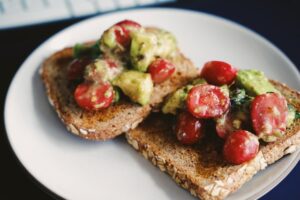What is it?
It’s no surprise that while on a plant-based diet you eat foods primarily from, you guessed it, plants. This isn’t just fruits and vegetables, but anything other than foods with animal ingredients. Any of the following types of foods are best to eat while on a plant-based diet:
- Fruits
- Veggies
- Tubers
- Whole grains
- Legumes
- Nuts and seeds
Plant-based diets vary. They can be used to describe vegan diets, vegetarian diets, or semi- vegetarian diets. It really is just shifting your diet to largely plant foods.
vegetarian diets. It really is just shifting your diet to largely plant foods.
People may switch to being primarily plant-based due to a number of reasons. It could be to improve their health, to better the environment, to save money, or for its ease.
Why it’s good for you
Eating a plant-based diet can do a lot of your health. This is because many plant foods contain something called phytonutrients.
Phytonutrients are natural chemicals found in plant foods that protect plants. They can build up our body’s defenses too.
Everday Health provides nine scientific benefits you can receive by following a plant-based diet:
- Lower blood pressure
- A healthy heart
- Less risk of type 2 diabetes
- Weight loss
- A potentially longer life
- Reduced risk of cancer
- Improved cholesterol
- Low risk of stroke
- A stronger brain
Your heart may thank you for eating a plant-based diet because, if you eat less meat, you eat less saturated fat which contributes to heart issues. Saturated fats also raise cholesterol levels and your risk of developing type 2 diabetes. In addition, fruits contain fiber and whole grains and veggies are digested more slowly– all this prolongs fullness. Getting these benefits long term would increase your chances of living longer. In terms of brain health, eating more fruit and veggies per day has been shown to reduce the risk of dementia and cognitive impairments.
How to succeed
In order to make sure you can reap all the benefits you can from eating plant-based, try implementing some of these tips from Harvard Health Publishing:

- Increase your vegetable intake, eat some with every meal or with some dip for a tasty snack
- Don’t use meat as a centerpiece or staple, use it as a garnish
- Choose healthy fats like olive oil, nuts, seeds, avocados, etc.
- Cook vegetarian meals more often
- Have whole grains for breakfast such as oatmeal, quinoa, buckwheat or add a side of fruit
- Steam, grill, or stir-fry leafy greens to preserve taste and nutrients
- Make a meal out of that usual side salad
- Eat fruit for dessert, they provide the sweetness you seek
Also, choose the right type of plant-based diet for you. Some plant-based diets eliminate animal products completely while some just reduce the amount you can consume.
A plant-based meal should contain portions of vegetables, fruits, whole grains, healthy oils, water, and healthy proteins. Harvard Health recommends limiting meat for protein and choosing fish, poultry, beans, or nuts instead. Protein should only make up a fourth of the plate at most.
They say there are three categories of plant-based diets: an overall plant-based diet, a healthful plant-based diet, and an unhealthful plant-based diet. A healthful plant-based diet is supposedly the most healthy and beneficial, while the unhealthful was the worst. An unhealthful plant-based diet limits the consumption of animal products like the others but increases the intake of processed plant foods such as pasta, processed cereals, chips, and sugary beverages. So if you are at risk for heart disease, be sure to avoid that last one.
What matters is figuring out how much animal products you should limit. You may not necessarily have to reduce your consumption of animal foods all that much to achieve a healthier diet that works for you. Like that popular saying– you really are what you eat. If your diet is too unbalanced, you are likely to be as well.
Sources
https://en.wikipedia.org/wiki/Plant-based_diet
https://www.everydayhealth.com/diet-nutrition/scientific-benefits-following-plant-based-diet/
https://wellnessaurus.com/the-benefits-of-phytonutrients/
https://www.health.harvard.edu/staying-healthy/the-right-plant-based-diet-for-you


Recent Comments